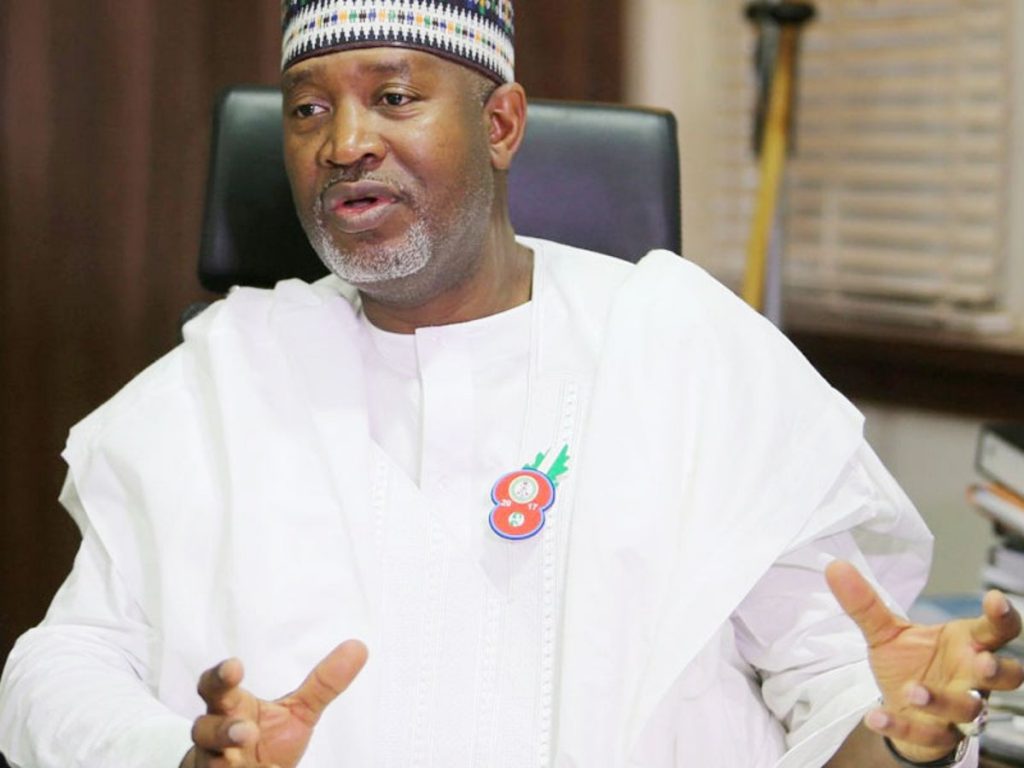Share!
Minister of Aviation, Hadi Sirika has given reasons why social distancing are not being observed by passengers on board an aircraft amid the coronavirus pandemic.
Speaking as he embarked on a simulation return flight to the Mallam Aminu Kano International Airport in Kano at the weekend, Sirika stated that the nature of the airplane remained so hygienic that social distancing was not necessary.
The honourable minister who had gone to the Kano airport to assess the preparation of the airport for resumption of flights, explained that the non-observation of physical distancing was also a way to minimise the cost of ticket fares and make it affordable.
“Because of the nature of the airplane, the airplane is hygienic enough once you have your mask, you are safe to remain seated on your seat and where possible, we will keep the distance,” he said.
“Airplanes are designed in such a way that the ambient air at altitudes is clean. It is not contaminated. The air is dropped in the aircrafts, pressurised and because of pressurization, the temperature of the air goes up to 200 degrees which is twice boiling water and there is no bacteria or virus that can survive it and it is suddenly cooled to about 2 degrees centigrate and then it is passed to a filter.
“Passing through the filtration system ensures that every single organism is screened and then it is passed to the cabin and once it is passed through the cabin, it comes from the ceiling downwards.
“So, it is not coming from the cockpit to the rear, it is from the ceiling downwards and it drops on the floor and gets circulated.
“With this mechanism in place, everything will be safe provided that we are decontaminating the airplane before we enter and decontaminating after we leave and also cleaning all the possible surfaces that one will touch.”
According to an information obtained by MERIDIAN SPY, the International Air Transport Association (IATA) supports the wearing of face coverings for passengers and masks for crew while on board aircraft as a critical part of a layered approach to biosecurity to be implemented temporarily when people return to traveling by air.
The IATA, however noted that “it does not support mandating social distancing measures that would leave ‘middle seats’ empty”, according to a statement published on its website on May 5, 2020,
“Evidence suggests that the risk of transmission on board aircraft is low,” it added. “Mask-wearing by passengers and crew will reduce the already low risk, while avoiding the dramatic cost increases to air travel that onboard social distancing measures would bring.
“IATA recommends mandatory face-coverings for passengers and masks for crew as one of several actions to reduce the already low risk of contracting COVID-19 on board aircraft.
In addition to face coverings, these layers of temporary biosecurity measures being proposed include:
- Temperature screening of passengers, airport workers and travelers,
- Boarding and deplaning processes that reduce contact with other passengers or crew,
- Limiting movement within the cabin during flight,
- More frequent and deeper cabin cleaning; and
- Simplified catering procedures that lower crew movement and interaction with passengers.
“When proven and available at scale, testing for COVID-19 or immunity passports could also be included as temporary biosecurity measures.”
The association further noted that it does not recommend restricting the use of the ‘middle seat’ to create social distancing while onboard aircraft.
“Evidence, although limited, suggests that, the risk of virus transmission on board aircraft is low even without special measures,” it added.
Related posts:
- Nigeria Government Seizes Foreign Aircraft Operating Commercial Services Without Clearance
- BREAKING: Abuja, Lagos Airports To Resume Domestic Flight Operations On July 8
- Banks In FCT, Lagos And Ogun To Reopen On Monday – FG
- Fresh $5.513bn Loan: SERAP Writes Buhari, Seeks Spending Details, Audit Of Loans
